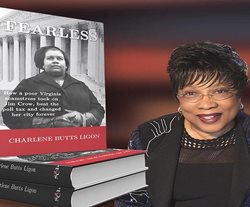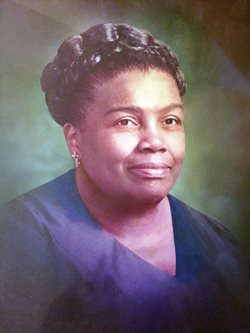Women’s History Month
Daughter Tells Her Story in New Book
As America recognizes the 100th anniversary granting women the right to vote, Norfolk State University and the city of Norfolk honor a local black woman who fought laws that effectively denied black Virginia residents their right to cast a ballot.
 Evelyn T. Butts of Norfolk, a poor seamstress who challenged Virginia’s poll tax in a court case that went all the way to the U.S. Supreme Court, became one of the most influential African American political leaders of her time. Her daughter, author Charlene Butts Ligon, is keeping her story alive in her book Fearless: How a poor Virginia seamstress took on Jim Crow, beat the poll tax and changed her city forever.
Evelyn T. Butts of Norfolk, a poor seamstress who challenged Virginia’s poll tax in a court case that went all the way to the U.S. Supreme Court, became one of the most influential African American political leaders of her time. Her daughter, author Charlene Butts Ligon, is keeping her story alive in her book Fearless: How a poor Virginia seamstress took on Jim Crow, beat the poll tax and changed her city forever.
Poll taxes emerged as part of a package of laws throughout the post–Reconstruction South in the late 1800s and early 1900s and were used as a technique by white southern politicians to bypass the 14th and 15th amendments to the U.S. Constitution, which secured liberties for African Americans and guaranteed them the right to vote, according to a Norfolk Public Library news release. As a pre-requisite for voting, Poll tax laws imposed a $1.50 tax on any person registering to vote. The tax had to be paid for three years preceding the election. This practice often caused a hardship for blacks and poor whites.
 In 1963, Butts filed a lawsuit with attorney Joseph A. Jordan Jr. challenging Virginia’s poll tax. Her lawsuit was combined with a similar one filed by several individuals in Fairfax County, Virginia and was argued before the U.S. Supreme Court as Harper v. Virginia Board of Elections (1966). Although the 24th Amendment to the U.S. Constitution, outlawed poll taxes as a perquisite for voting in 1964, five states — Alabama, Mississippi, Texas, Arkansas and Virginia — retained the practice. On March 24, 1966, the Court ruled 6-3 that poll taxes were an unconstitutional violation of the equal protection clause of the 14th Amendment.
In 1963, Butts filed a lawsuit with attorney Joseph A. Jordan Jr. challenging Virginia’s poll tax. Her lawsuit was combined with a similar one filed by several individuals in Fairfax County, Virginia and was argued before the U.S. Supreme Court as Harper v. Virginia Board of Elections (1966). Although the 24th Amendment to the U.S. Constitution, outlawed poll taxes as a perquisite for voting in 1964, five states — Alabama, Mississippi, Texas, Arkansas and Virginia — retained the practice. On March 24, 1966, the Court ruled 6-3 that poll taxes were an unconstitutional violation of the equal protection clause of the 14th Amendment.
After the ruling, Butts stepped up her efforts by helping thousands of African Americans register to vote for the first time. She also spearheaded a variety of voter education initiatives and helped found the Concerned Citizens for Political Education, which was the most influential African American political organization in Norfolk during the 1970s. By the end of the decade, she was considered one of the region’s most important African American political leaders.